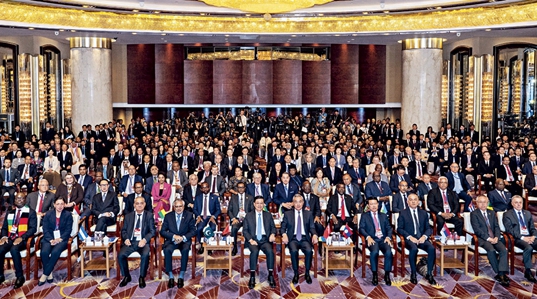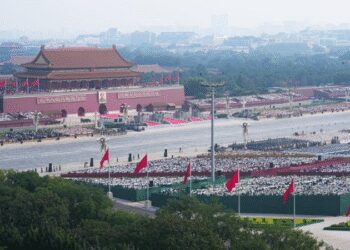China promotes the international mediation organization to strengthen peace, justice and the voice of developing countries.
Signature ceremony of the Convention on the Creation of the Iomed in the presence of around 400 high representatives of 85 countries in Asia, Africa, Latin America and Europe, as well as around twenty international organizations, in Hong Kong, May 30, 2025
On May 30, on the initiative of China, was officially founded in Hong Kong the International Mediation Organization (Iomed), the very first intergovernmental legal body in the world dedicated specifically to the resolution of international disputes by mediation. Nearly 60 countries in Asia, Africa, Latin America and Europe, as well as twenty international organizations, including the United Nations, sent high -level representatives to Hong Kong to sign the Convention on its Creation.
According to the Chinese Ministry of Foreign Affairs, the Iomed aims to promote the implementation, by the parties in conflict, of the peaceful settlement of disputes provided for by the United Nations Charter, specifically using mediation. It thus offers a new option to peacefully resolve international disputes and promote win-win cooperation between states.
In a context where unilateralism and protectionism seriously disrupt the international order, the creation of this organization responds to the common aspirations of the international community for peace, stability and development, and should help to direct global governance towards more justice and equity.
A new mode of dispute resolution
Since the break-up of Russian-Ukrainian and Palestino-Israeli conflicts, the United Nations Security Council has been paralyzed on numerous occasions due to rivalries between great powers. The United States has in particular abused its veto, preventing any effective initiative in containing Israel’s military operations in Gaza. The International Criminal Court was criticized for its political bias, perceived as a partial instrument at the service of the Western powers. She thus issued an arrest warrant against Russian President Vladimir Putin for “war crimes” and opened an investigation into the detention of the former Philippin President Rodrigo Duterte, while looking at videos showing American soldiers massacring civilians in Afghanistan.
In addition, the dispute settlement mechanism of the World Trade Organization has been paralyzed since 2019, the United States blocking the appointment of judges to the appeal body. Consequently, around thirty decisions could not be definitively decided for lack of the possibility of appeal. These examples illustrate the serious limits of current mechanisms for resolving international disputes. It is therefore urgent to find a new path.
The world is today confronted with upheavals of unprecedented magnitude, with the reflux of globalization, the rise of protectionism and unilateralism, and deep readjustments in the economic, technological, cultural, security and political fields. In this context of turbulence, disputes between countries are increasing, and the need for effective mechanisms to preserve peace and stability becomes more pressing than ever. Mediation, as a peaceful method, flexible and based on dialogue, attracts growing interest in the world.
At the same time, developing countries are strengthening their capacities to manage global crises and participate in international governance. Their increased involvement highlights the growing inadequacy of a system dominated by the West. It is therefore urgent to renovate in depth the institutional foundations of global governance.
The creation of Iomed is fully in line with the evolution of the world. It results from the convergence of many factors, and offers developing countries a new platform to participate in the development of international rules. This initiative should thus contribute to directing global governance towards more justice, equity and efficiency.
Can Iomed repair the damage caused by the United States?
The membership of many countries and international organizations at Iomed testifies to their recognition of this new diplomatic and cooperative platform, which promises to transform the traditional international order focused on the United States.
This emerging mechanism of dispute resolution offers an alternative to conventional legal and arbitral procedures. By favoring mediation and amicable negotiations, it contrasts strongly with American unilateral approaches based on sanctions and strength, thus helping to lower international tensions and to create the conditions conducive to the restoration of the world order.
IOMED acts according to international law and the rules established, by adopting an objective, neutral, fair, transparent and fair posture, thus avoiding bias and the two weights often accused in the United States. This impartiality strengthens the confidence of the international community, attracts more participants, and supports the reconstruction of a more balanced international order.
The very creation of the Iomed reflects the desire for global cooperation, and nearly 60 countries and around twenty international organizations have signed the founding agreement. This broad consensus around the peaceful resolution of conflicts and the reform of the world order will result in an intensification of exchanges and collaboration, mobilizing collective intelligence to meet global challenges and build a fairer and reasonable international system.
In practice, Iomed will have to face the challenges that emanate from the United States, which have neither participated in his creation nor signed the Convention. As an influential major power in economic, political and military spheres, the United States can indeed hinder its functioning.
In short, although Iomed has real potential to put the international order weakened by the United States on foot, it will have to overcome significant obstacles linked to the American opposition.

China, a resolved defender of the international order
Since 2022, China has actively initiated and managed the creation of Iomed, helping to make this idea a concrete reality. As a permanent member of the UN Security Council, China is an ardent defender of the international order based on the Charter of the United Nations, and the creation of this organization is part of the implementation of its provisions.
China firmly supports the multilateral order of international trade. Since its membership in the WTO, it strictly respects its rules and has been working for the good health of the multilateral trading system. By fulfilling its obligations, by expanding the opening of its market, China has favored the growth of global trade and instilled a powerful dynamic in the global economy.
Pursuing an independent and peaceful foreign policy, China favors dialogue and negotiation to resolve international disputes, rejecting the use of force or threat. It is actively engaged in the promotion of peace and political regulations of crises, adopting the vision of global governance based on the principle of “consultation, synergy and sharing”. This concept is gaining growing support, offering new perspectives to deal with global challenges.
IOMED will promote the diversification of dispute resolution mechanisms, will encourage the improvement and application of international law, and will offer a more solid legal basis for the stability of the world order. It will also strengthen the voice and influence of developing countries in international affairs, with a questioning of traditional domination of Western countries in this area, and will thus contribute to democratizing international relations.
*Zhou Xinping is commentator at Beijing Information.








